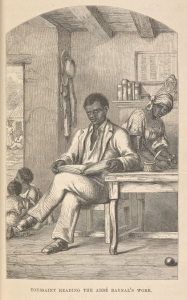2.1 Chapter Overview and Learning Objectives
2.1.1 Learning Objectives
- Describe how different sociological traditions have developed.
- Understanding the social origins of sociological theory.
- Explain the key concepts and limitations of classical sociological theory.
- Understand how sociology developed in the United States.
- Differentiate between contemporary theoretical perspectives.Overview Licenses and Attributions

During the same period as the American and French Revolutions, a country of enslaved people rose up against their colonial masters. This revolution, which lasted from 1791 to 1804, resulted in the first country to abolish slavery and in the defeat of the most powerful European empires. Yet many people don’t know about the Haitian Revolution, and few mainstream sociologists study this important event. Why is this? Why is the French Revolution given more attention than the Haitian Revolution?
Some argue that by erasing the importance of the Haitian Revolution from modern history, Euro-American countries were able “to claim abolitionist bragging rights rather than reckoning with their centuries-long participation in Atlantic slavery and only slow and grudging decisions to end it” (Gaffield 2020). Using our sociological imaginations, we could also point to how a person’s social position influences what they know or what they deem worthy of theorizing. If influential theorists were largely white and European, how much attention would they give to racial oppression?
In this chapter we will examine how sociology emerged in Europe and the United States and how social theorists tried to explain the patterns and changes they saw in their societies. In doing so we will also explore voices that have typically been overlooked in American sociology, usually because of their race, gender, and/or nationality. We will then turn to contemporary approaches to thinking about the social world.
2.1.2 Licenses and Attributions for Overview
Figure 2.1. Toussaint L’Ouverture reading the Abbé Raynal’s work. By J.R. Beard. Public Domain, via Wikimedia Commons.
“Overview” by Matthew Gougherty is licensed under CC BY 4.0.
